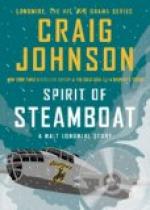“You are no true Christian knight,” I said. “Your Rinaldos and Sir Guyons always waste your gardens of voluptuous delight, and wipe out their abominations.”
“Yes,” he retorted, “all but the abomination of desolation.”
“But do you consider,” said Fred, “how many sweet birds may be looking out through the bars of those bright lattice cages even now, who can follow neither their hearts’ desires nor their souls’ aspirations, but whom fate has degraded to be the slaves of some miserable old Blue Beard?”
“Why don’t you sail in and rescue some of them?” said Mike mockingly. “Tell the old tyrant to his cerulean beard that he has too many strings to his bow, and he will undoubtedly spare a bow-string to twine around your manly neck. But I guess you had better, after all, leave the Fatimas to their fate. The barriers that fence them in from their hearts’ desires and souls’ aspirations here are not more real, if more palpable, than those that guard them in our land of boasted freedom; neither are they altogether secure from sale and barter there; and as for us outside barbarians, I’d as lief be shut out by palace walls from a beauty I can only imagine, as by custom still more insurmountable from beauty set visibly before me and enhanced with intellectual and social graces.”
I cited the lady in the song, who says:—
A tarry sailor
I’ll ne’er disdain,
But always I will
treat the same,
as proof that such exclusiveness was far from being the universal rule at home, and encouraged him to rival the “swabber, the boatswain and mate” for “Moll, Mag, Marion, and Margery.”
“Or,” said he, “like the jolly tar you quote, dismiss both your songs as ‘scurvy tunes,’ and, swigging at a black jack, say: Here’s my comfort.”
“I am not sure,” said Fred bitterly, thinking of his own rejected suit, “that Stephano’s philosophy is not the best for wretches like us.”
“Yes,” said Mike, “until after the Millennium. Then the march of civilization will be ended, and the ranks may be broken. Then soft hands and hard hands may clasp each other. Then rays from the purest and most refined souls may shine through bright eyes without being especially chilled for those whom a cold destiny makes especially needful of their heart-warming influences. Then you, poor as you are, may aspire to wed the daughter of a banker, and Joe or I may seek to satisfy the heart’s desires of the Sultan’s daughter, without Aladdin’s lamp or Oberon’s whistle.”
Here our strange auditor came forward with a small tin whistle in his hand, and gravely presenting it to Fred, he advised him to try its note on the hard-hearted parent who opposed his happiness. In the deepening twilight, Fred and Mike, putting their heads together, read the following legend graven upon it:—
O whistle, and I’ll come to you, my lad!
We all laughed outright, except the donor.




